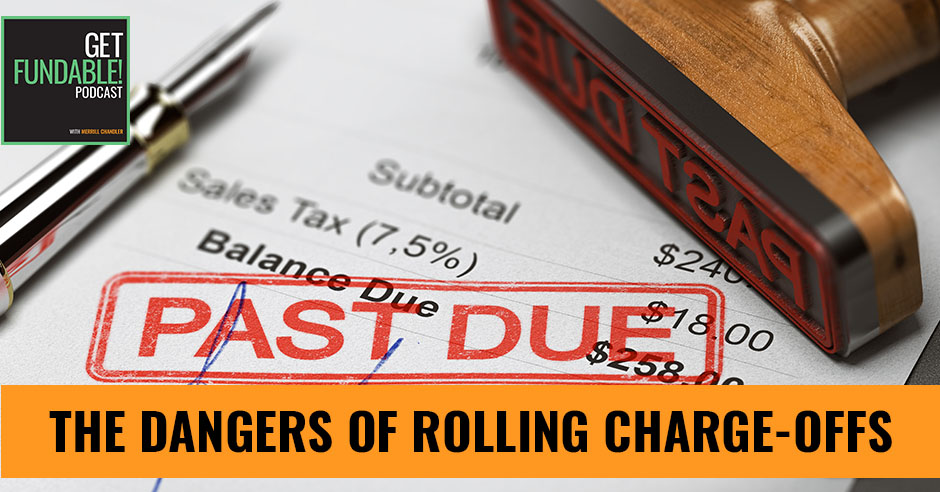
Do you know what a rolling charge-off is? In this episode, Merrill Chandler defines the term and how it can affect your finances, especially your credit profile. Understand how missing a due payment can escalate your financial issues by tuning in. Plus, get practical tips with real world examples from Merrill. Stay tuned!
—
Watch the episode here
Listen to the podcast here
The Dangers Of Rolling Charge-Offs
I’ve done research everywhere, and nobody is talking about this. I don’t understand why I’m the only one who can connect these dots and see the travesty that’s happening with regards to some credit reporting issues. When we get back, we’re going to be talking about what we call a rolling charge-off and how destructive it is to your profile or any profile that comes in contact with. I’ll see you in a moment.
—
No joke, guys, rolling charge-offs. What do I mean by a rolling charge-off? First of all, let’s talk about what a charge-off is, what it means to your credit profile, etc. This is going to be a visual alert. If you can watch this on our YouTube channel, if you can watch this at GetFundablePodcast.com, it will be valuable to see. I will speak plainly and clearly, so those of you who are on audio will be able to understand what we’re talking about. If you can watch it, I’m telling you it’s going to add a whole new layer to your understanding. Let’s get into it.
What is a charge-off? In the account degradation process, when an account degrades from paid as agreed, your current, it goes 30 days late, 60 days late, 90 days late. By the way, anything after 60 days, late, FICO grades as serious delinquency. If you have two 30-day lates, it equals that 60-day late, so the two 30s are serious delinquency. It does accumulate. It aggregates how many days late you bet. It goes 30 days, 60 days, 90 days late, and then somewhere around 90 days or 120 days late, then a lender, many times, will charge off the debt that you owe.
A couple of things are important to understand about this. Charging it off does not mean you don’t owe it. Charging it off means they’re going to put it as a loss on their taxes. Just like we as entrepreneurs and small business owners, we have our income and then we have our expenses, then we have our assets. People owe us money. The money you owe your lender would be an asset on their balance sheet. If you stop paying them and they can’t collect it, it ends up as a write-off. They charge it off. They write it off on their taxes.
When they write it off on their taxes, the taxes that they’re looking at says that you still owe the money, but you are incapable of paying it and they’d rather write it off on their taxes. What this means, however, is that you’re in a position. They might send you a 1099 miscellaneous income for a tax form saying, “You borrowed $12,000. You didn’t pay the $12,000 back. I want to write that off and charge it to you because somebody has to pay for it on their taxes.” If they’re writing it off, that means they may be sending that income to you, and they’re passing along the tax liability. They’re passing the tax liability to you because the money was there. You used it, you didn’t pay it back, so they’re going to send you a 1099 saying you received miscellaneous income.
Having said that, let’s go to what a charge-off looks like. I’m going to pull up an example here on what a charge-off looks like on my FICO report. This is a Sallie Mae, which it means it’s a student loan. Notice it’s Equifax, TransUnion and Experian are all reporting this as charged off. They have different language for it, but it is relatively the same. It’s a bad debt, a charge-off or other derogatory, bad debt or collection, and the balance is for $12,286.

Rolling Charge Offs: Charging it off does not mean you don’t owe it. Charging it off means they’re going to put it as a loss on their taxes.
In the world of charge-offs, a charge-off means that they cut it off. You’re not 30, 60, 91, 21, 80, and late forever and ever. Charging it off means that it’s fixed in time. They’re taking it off the books and it stops accruing negative impact against your profile and against your score. In this case, it charged off in 2020. As I’m going to show you right now, there is an additional set that FICO is showing. If you take a look at what’s on the screen, notice going backwards, January of 2021 through December of 2021, Experian and Equifax, both show CO, charge-off, but here’s the problem. It was charged off. Look at 2020.
For those who can’t see, what we’re looking at is a 24-month lookback period. The last payment was made on this student loan in April of 2020. Last payment was made and it says “Okay,” under April of 2020. In May of 2020, it says it was charged off. The way the credit system works, the way charge-off works, the way everything works is that charge-off can only be listed once on your credit profile. As we saw in that previous screen, it says charge-off is bad debt. It was charged off on May of 2020.
For those of you who can see it, and for those who can’t see, I’ll describe it to you. May June, July, August, September, October, November, December of the rest of the year of 2020, and the entire year of 2021 all have CO on the Experian and the Equifax lines. That means a fresh charge-off of this account is being graded against this profile every single month. There should have only been one charge-off, May of 2020. It should have stopped there, and then NR, Not Rated, should be the only listing.
If you look at TransUnion, TransUnion says Not Rated for the entire period. TransUnion charged it off and is not grading it at all. Equifax and Experian, each of them, are showing that a brand-new charge-off of this account continues to grade against this profile. That is not legal. It’s not accounting accurate, like the General Accounting Principles, GAP. The General Accounting Principles, that’s against GAP rules, that’s against everything. This is a credit reporting mistake.
Fixing this is a minefield because you have to coordinate between credit bureaus and the original owner of this. In this case, it was Sallie Mae. There’s a whole bunch of things that you have to do to fix this, but I wanted to bring this up and remind you that since each one of these, Equifax and TransUnion, the scores for Equifax and Experian are significantly lower than TransUnion. Why? Because the score sees that a brand-new charge-off is occurring every single month when it should have stopped back in May of 2020. That’s almost 15 months of bad credit reporting.
It’s a huge issue, and this is not uncommon. My job is to share with you what the problem is and why it’s a problem. If you have more than one CO on any of your 24-month lookback period, if there are 3 or 7, in this case there are 15 of them, you’ve got to handle that because these gentlemen scores were in the low 500 and TransUnion was in the low 600, about an 85-point difference between where they’re showing the charge-offs and TransUnion who charged it off once. Now, it’s been aging.
If they're writing it off, that means they may be sending that income to you and they're passing along the tax liability. Share on XIt’s been aging for almost a full 24-month lookback period to gather back the points. As we know and as I’ve described in other episodes of the show, the longer it has been since we did a negative behavior, the less it counts against us. Here on these rolling charge-offs continue to count as a fresh charge-off every single month.
We’re moving into 2022. The credit report was pulled in January of 2022, so it only shows the previous months. If we watch this, these problems would continue to report for all of 2022 as well, because once it’s a glitch in the system, I do not believe for a second that any of this is intentional. It has been reported correctly, but it’s in a continuous loop to add this new charge-off for every single month that elapses. It has to be fixed manually.
I have never ever had a dispute successfully removed this. It’s always a series of phone calls, saying the right things to the right people, to get the reporting fixed so that the charge-off reported only once during the month that it was actually charged off. True story, one of my clients and now a good friend of mine, Mark, he had this very problem that was keeping him from buying his dream home on the beach in Monterey Bay in California. We went through this exact process. We’ve done it probably over a hundred clients, because it is a common error, but a regular dispute letter will not fix it. We need to know more details.
I would love to say, “These five points.” I’d love to tell you the five points in order to handle it. That is not the case. If you have a problem like this, if you’d like someone to weigh in on that, then follow the link and fill out an application so that we can collect some data for you and get a strategy session, and see how you might need to solve this particular problem. The bottom line is that if you see more than one charge-off, red alert, because it is not legal for them to change it.
As I’ve said, I haven’t seen one dispute letter say, “I’m sorry, it’s illegal for you to have more than one charge-off.” There’s nothing for them to verify. This is a manual change. In the case of Mark, literally after a few phone calls and an implementation of these advanced strategies, he was able to qualify, the rolling charge-offs were removed, and his score jumped up like 150 points. His fundability was immediate because there was nothing else wrong, but this one charge-off, which is four years old and was paid in full and was rectified, but the charge-off on his credit profile look just like you saw here. For four years, the most recent 24-month lookback had charge-offs every single month.
This is what we’ve got to fix. This is how we fix it. Check in and fill out the link for a strategy session if you’d like to investigate what’s going on with your particular profile and how we can address this. Please like, love, share wherever you’re seeing this, make sure your loved ones have it so that they can check their own profiles if it applies. Get it to them so that they have some actionable intel on exactly what to do next. I will see you soon.
Important Links
- YouTube – Get Fundable!




